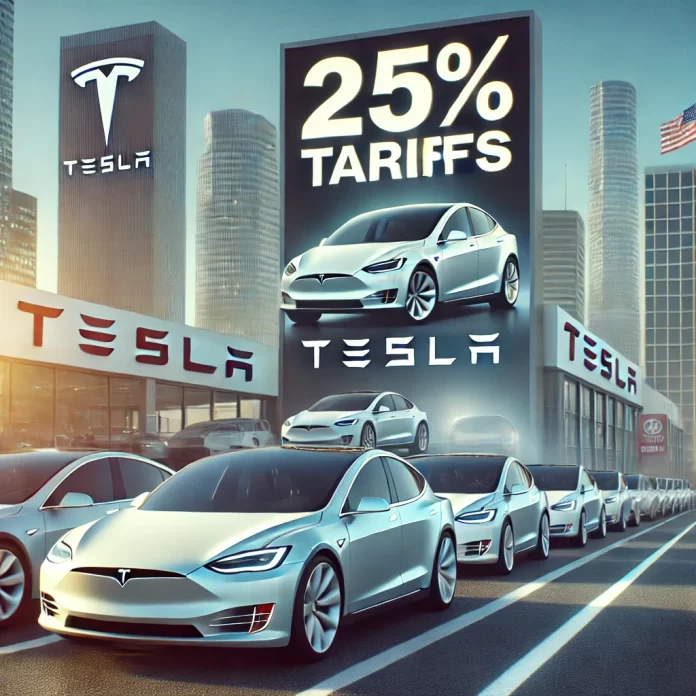U.S. President Donald Trump has announced a 25% tariff on imported cars and auto parts but Tesla is emerging as the winner while sending shockwaves through the global automobile industry.
New Tariffs Shake the Auto Industry
The tariffs, set to take effect on April 3, are expected to bring in $100 billion annually and push automakers to expand production in the United States.
Trump defended the move, calling it a “permanent” policy that would reduce reliance on foreign supply chains. “Anybody that has plants in the United States—it’s going to be good for them,” Trump told reporters, directly mentioning Tesla’s factories in Texas and California.
The announcement sparked immediate concerns among foreign automakers. Companies like Hyundai, Volkswagen, and Toyota—which manufacture many of their vehicles abroad—could see a significant increase in costs.
Canada Cracks Down on Tesla Over Suspicious $30M Subsidy Claims
Industry analysts warn that vehicle prices could rise by thousands of dollars, making new cars unaffordable for many Americans.
Tesla’s Advantage in the Tariff War
Despite Trump’s statement that the tariffs would be “net neutral or maybe good for Tesla”, Elon Musk quickly responded on X (formerly Twitter), saying the impact on Tesla is still significant.
It imports several key components, including batteries and electronic parts, which will now be subject to tariffs. However, unlike its rivals, Tesla builds all its U.S. vehicles in American factories, giving it a major advantage.
Industry experts say Tesla is “least exposed” to the tariffs compared to competitors. General Motors and Ford rely heavily on Mexico and Canada for production, while European and Asian brands import large numbers of vehicles. These companies will now face higher taxes, potentially increasing their car prices by as much as $12,500 per vehicle.
Tesla Faces Growing Crisis as More Owners Trade in Their Vehicles
Model Y and Model 3, already the best-selling electric vehicles in the U.S., may now gain even more market share as imported competitors become more expensive.
Stock Market Reactions and Industry Fallout
The stock market reacted immediately after Trump’s announcement. Shares of General Motors and Stellantis (Jeep’s parent company) dropped by nearly 3%, while Ford’s stock remained mostly stable. Interestingly, Tesla shares closed down 5.5%, suggesting investor uncertainty over how the company will handle rising costs.
Elon Musk, quickly disagreed with Trump’s rosy outlook. On X (formerly Twitter), Musk wrote that the tariffs would still hurt. Why? Because while Tesla assembles cars in the U.S., it relies on imported parts like batteries and electronics. “The cost impact is not trivial,” he explained.
Tesla Warns of Rising Costs and Supply Chain Issues from Tariffs
In a letter to the U.S. government, Musk admitted that some parts are “impossible” to source locally, even though they try to use American-made materials as much as possible. This means vehicle production costs could rise, forcing them to raise car prices.
Tesla isn’t completely safe. Here’s the problem:
Imported Parts = Higher Costs: Tesla uses batteries from China and chips from Taiwan. A 25% tax on these parts means EV production costs rise. Musk warned this could force price hikes on cars like the Model Y SUV or Model 3 sedan.
Global Sales Are Slumping: Tesla’s sales in Europe (especially Germany) have dropped sharply. Attacks on Tesla stores and cars in the U.S. and Europe aren’t helping.
Meanwhile, automakers are scrambling to respond. Some companies, like Hyundai and Volkswagen, are accelerating plans to open new U.S. factories, while others may consider shifting more production to America. However, this process could take years, leaving Tesla in a strong position in the short term.
As the tariff deadline approaches, the auto industry is bracing for major changes. With competitors struggling with new costs, Musk may emerge as the biggest winner in Trump’s trade war—even if Musk isn’t ready to admit it.


